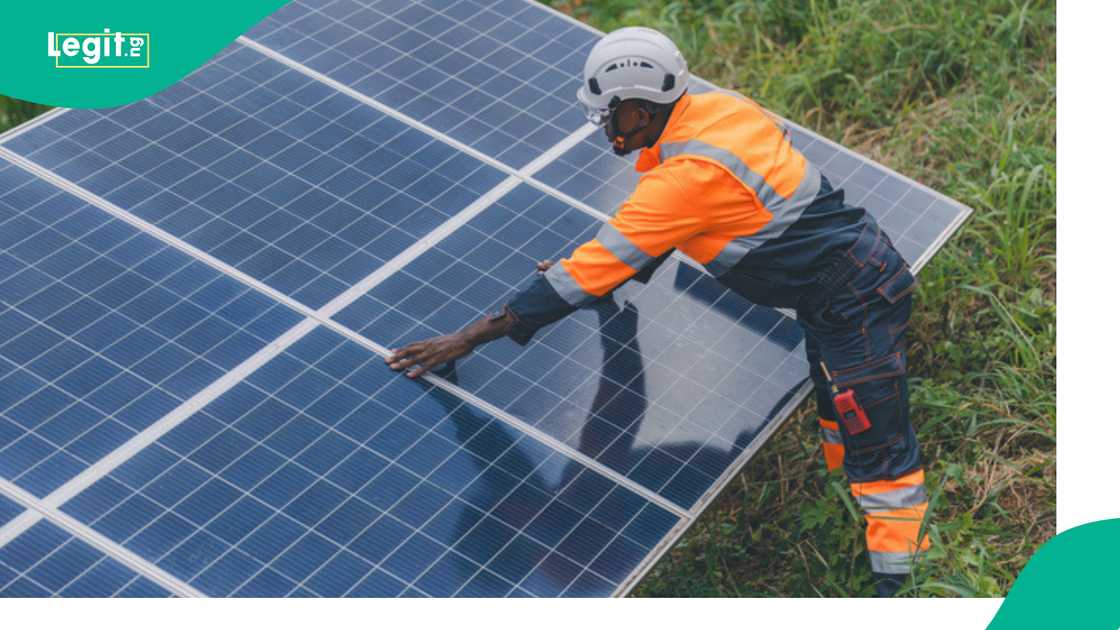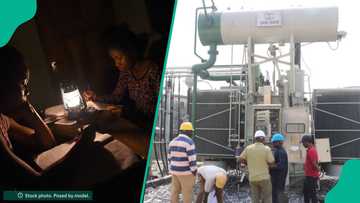Nigeria's Solar Panel Importation Declines as FG Insists on Ban
- In Q1 2025, Nigeria saw an 89% drop in solar panel imports, totalling N125.294 billion, compared to N237.309 billion in Q4 2024
- The Managing Director of the Rural Electrification Agency, Abba Aliyu, highlighted that local production has increased
- The federal government plans to halt solar panel imports to boost local manufacturing and encourage off-grid solutions
Legit.ng journalist Zainab Iwayemi has 5-year-experience covering the Economy, Technology, and Capital Market.
In the first quarter of 2025, Nigeria saw an 89% decrease in the importation of solar panels.

Source: Getty Images
Data from the National Bureau of Statistics (NBS) Q1 2025 Foreign Trade Statistics shows that the country imported N125.294 billion worth of solar panels, also known as "photovoltaic cells assembled in modules or made up into panels," which is less than the N237.309 billion imported in the final quarter of 2024.
This comes as Abba Aliyu, the Managing Director/CEO of the Rural Electrification Agency (REA), recently claimed that Nigeria can currently produce 600 megawatts of PV panels.
According to Aliyu, the nation's production capability was only 110 MW before, but there is now a fully operating LPV in Lagos with a 100-megawatt capacity.
“Here in Abuja, we have a JRV with a 250-megawatt capacity. We have OandO with a 120-megawatt capacity, and we have GridConnect, which is about to complete a 150-megawatt capacity in Idu here in Abuja. So, that’s in the aspect of localisation. We are changing that narrative. We also have more than 50 renewable energy service companies. Before now, we only had about 10 of them.”
In an effort to encourage domestic production and hasten Nigeria's shift to clean energy, Daily Trust reported that the federal government also announced intentions in March to stop importing solar panels.
During the unveiling of the NEV T6 electric buses in Abuja, Uche Nnaji, the Minister of Science and Technology, said that the action aligns with the presidential order, which prioritises local content in science, engineering, and technology.
With the National Agency for Science and Engineering Infrastructure (NASENI) playing a significant role in local manufacturing, the minister pointed out that Nigeria is capable of producing its own solar panels.
More homes and organisations would switch to off-grid power options as local production grows, he said.
“We have lithium in abundance here in Nigeria, so Mr. President is already taking action. We are adding value to our raw materials. The lithium we have here will be processed and used as batteries for these vehicles,” he added.

Source: Getty Images
Nnaji stated that the government is creating mini-grid solutions to support homes, hospitals, and other institutions to address the nation's power issues.
“If you look at our budgets, we have what is called mini-grids all over the place. In less than three or four months, you will start seeing our hospitals and institutions being powered by solar,” he said.
“Again, we are saving the environment; we’re putting in place non-carbon-emission infrastructure. So, we are creating power everywhere. It is not about using diesel, it is not about using PMS, it is not about generating power that will pollute the environment.
“With NASENI here, you know that we have panels. It has a factory that has started producing solar panels, and other private individuals are also producing solar panels as we speak. So, all we need to do is, even though science and technology, through our Presidential Executive Order No. 5, we will stop all these importations of solar panels. We will support our local industries to grow, and very soon, most houses will go off-grid. Personally, I have been off-grid for over three years, and it is working.”
Laura Ekene said,
"The government should allow the eimportation of solar because it has been of help to so may people."
FG insists on ending solar panel imports
Legit.ng reported that amid the crisis in Nigeria’s power sector, the importation of photovoltaic solar panels has risen in recent years, now amounting to almost N200 billion annually.
However, the federal government has insisted on ending the importation of solar panels as a means to save the much-needed foreign exchange and reduce pressure on the naira.
The government is instead looking in a different direction and has recently revealed what will be the alternative to solar panel imports.
Source: Legit.ng




